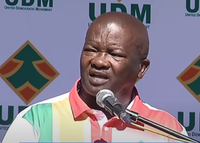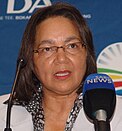
Back Suid-Afrikaanse algemene verkiesing van 2004 Afrikaans Parlamentswahl in Südafrika 2004 German Elecciones generales de Sudáfrica de 2004 Spanish Élections générales sud-africaines de 2004 French Eleccións xerais de Suráfrica de 2004 Galician Elezioni generali in Sudafrica del 2004 Italian Zuid-Afrikaanse parlementsverkiezingen 2004 Dutch Парламентские выборы в ЮАР (2004) Russian
| |||||||||||||||||||||||||||||||||||||||||||||||||||||||||||||||||||||||||||||||||||||
All 400 seats in the National Assembly 201 seats needed for a majority | |||||||||||||||||||||||||||||||||||||||||||||||||||||||||||||||||||||||||||||||||||||
|---|---|---|---|---|---|---|---|---|---|---|---|---|---|---|---|---|---|---|---|---|---|---|---|---|---|---|---|---|---|---|---|---|---|---|---|---|---|---|---|---|---|---|---|---|---|---|---|---|---|---|---|---|---|---|---|---|---|---|---|---|---|---|---|---|---|---|---|---|---|---|---|---|---|---|---|---|---|---|---|---|---|---|---|---|---|
| Registered | 20,674,926 | ||||||||||||||||||||||||||||||||||||||||||||||||||||||||||||||||||||||||||||||||||||
| Turnout | 76.70% ( | ||||||||||||||||||||||||||||||||||||||||||||||||||||||||||||||||||||||||||||||||||||
| |||||||||||||||||||||||||||||||||||||||||||||||||||||||||||||||||||||||||||||||||||||
 | |||||||||||||||||||||||||||||||||||||||||||||||||||||||||||||||||||||||||||||||||||||
| |||||||||||||||||||||||||||||||||||||||||||||||||||||||||||||||||||||||||||||||||||||
| This article is part of a series on the |
| Politics of South Africa |
|---|
 |
|
|
General elections were held in South Africa on Wednesday, 14 April 2004.[1] The African National Congress (ANC) of President Thabo Mbeki, which came to power after the end of the apartheid system in 1994, was re-elected with an increased majority.
These were the third elections held since the end of the apartheid era. The South African National Assembly consists of 400 members, elected by proportional representation.[2] 200 members are elected from national party lists, the other 200 are elected from party lists in each of the nine provinces. The President of South Africa is chosen by the National Assembly after each election.
The ANC, which had been in power since 1994, obtained 69.7% of votes cast on the national ballot, theoretically allowing them to change the constitution.
Some 20.6-million people were registered for the 2004 general elections, which was about 2 million more than in 1999.[3] About 76% of registered voters took part in the election, with the ANC receiving 69.7% of the votes cast. However, only 56% of eligible voters (South African citizens of voting age) took part in the 2004 election, which means that the ANC received votes from only about 38% of all eligible voters.[4][5]
The year 2004 saw an increase in voter abstention and there was at least one high-profile election and registration boycotts campaign, the No Land! No House! No Vote! Campaign.[6][7] A major electoral issue during the election was the dominance of the ANC; detractors of the ANC, most notably the Democratic Alliance, argued that the party's political dominance posed a threat to the country's democratic institutions and that voters should therefore vote for opposition parties.[8]
The main opposition party, the Democratic Alliance, also obtained an increased percentage on the national ballot, most likely from former supporters of the New National Party (NNP), possibly losing some support to Patricia de Lille's new Independent Democrats. The NNP, a descendant of the ruling party of the apartheid era, collapsed and lost most of their support, dropping from 6.9% in 1999 to 1.7% (it was 20.4% in 1994), many of their supporters being unhappy with their alliance with the ANC. The NNP alliance with the ANC allowed the ANC gain control of the Western Cape and City of Cape Town; following the election the NNP elected to dissolve and merge with the ANC.[9]
The Independent Democrats surprised many observers by obtaining more votes than the New National Party, becoming the fifth largest party. The Inkatha Freedom Party lost some support, including the majority in their stronghold province of Kwazulu-Natal, while the United Democratic Movement also lost support, barely hanging on as opposition in their stronghold, the Eastern Cape. As of 2024 this is the last election in which the ANC made gains in both seats and popular vote.
Cite error: There are <ref group=lower-alpha> tags or {{efn}} templates on this page, but the references will not show without a {{reflist|group=lower-alpha}} template or {{notelist}} template (see the help page).
- ^ "Election Resources on the Internet: Republic of South Africa 2004 General Election". Election Resources on the Internet. Retrieved 16 August 2019.
- ^ "How Parliament is Constructed". Parliament of the Republic of South Africa. Archived from the original on 24 March 2019. Retrieved 16 August 2019.
- ^ "Archived copy". Archived from the original on 2 February 2018. Retrieved 20 April 2009.
{{cite web}}: CS1 maint: archived copy as title (link) - ^ McKinley, Dale T. (29 April 2004). "South Africa: A disillusioned democracy". Green Left Weekly. Archived from the original on 18 September 2006. Retrieved 21 September 2006.
- ^ "ANC wins South African elections in low voter turnout". wsws.org. 17 April 2004.
- ^ "The 'No Land, No House, No Vote' campaign still on for 2009". Abahlali baseMjondolo. 5 May 2005.
- ^ "IndyMedia Presents: No Land! No House! No Vote!". Anti-Eviction Campaign. 12 December 2005. Archived from the original on 25 April 2009.
- ^ Southall, Roger (2005). "The 'dominant party debate' in South Africa" (PDF). Afrika Spectrum. 39: 61–82.
- ^ Alence, Rod. "South Africa After Apartheid: The First Decade". Journal of Democracy. p. 82. Retrieved 26 February 2022.





